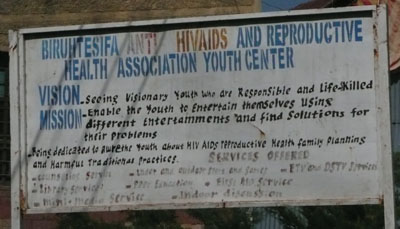Girls and boys aged 10-14 years living with their parents
Young people in early adolescence (aged 10-14 years) who live with their parents are often forced into early marriage, and suffer its consequences including early pregnancy leading to child birth complications such as fistula. They could also suffer sexual violence including female genital mutilation (FGM), abduction, polygamy and rape which predisposes them to STIs/HIV/AIDS. Because of lack of economic resources and unequal power relations with spouses girls are often unable to negotiate condom use with older spouses.
The fact that they have poor health seeking behaviour with limited access to antenatal or postnatal care and skilled delivery contributes to the high maternal mortality in this age group.
Boys are particularly at risk of dropping out of school to work. Those who migrate to urban areas are likely to live on the street.
The box below shows the main activities that you are expected to undertake on behalf of young people in early adolescence (aged10-14 years).
Key actions for young people aged 10-14 years who are living their parents
- Sensitise community leaders, religious leaders and parliamentarians on SRH so that they will advocate on behalf of 10-14 year olds having access to appropriate information and services
- Select and train mentors and educators from the community
- Train peer educators from this age group (equal number of boys and girls) on SRH to disseminate advice on SRH and provide non-prescriptive contraceptives in clubs and other venues
- Provide age appropriate family life education in clubs and other venues where this group gather
- Awareness creation/sensitisation on the new family law which sets the minimum age of marriage at 18 years for both males and females
- Monitor and follow up implementation of SRH at the community level
- Provide training on gender and its effects on the reproductive health of young people
- Provide technical and material support to parent and teachers associations (PTAs).
- Provide technical and material support to create "safe spaces” for child brides
- Provide SRH training and family life education, negotiation and assertiveness skills for girls aged 10-14 years who are about to be married or who have already married
- Provide trained community volunteers to seek out child brides and persuade them to come to health facilities for antenatal, postnatal and delivery care.
You can use the following strategies to accomplish the activities indicated above:
- Create parent-teacher associations (PTAs) in schools and within the community as advocates and to follow up on enrollment and retention rates of female and male students.
- Advocate against early marriage, gender based violence and other HTPs.
- Create safe places (e.g. church, mosque) where groups meet, support each other, exchange information and receive sexual and reproductive health information and services.
- Promote antenatal, postnatal and skilled delivery services to this age group.
- Encourage and provide incentives to bring married girls and boys who have dropped out of school back to school.
- Encourage making schools gender sensitive (i.e. separate toilets for girls and boys, reduce harassment of girls on the road to schools).
- Organise Reproductive health/HIV/AIDS clubs in-school and out-of-school.
